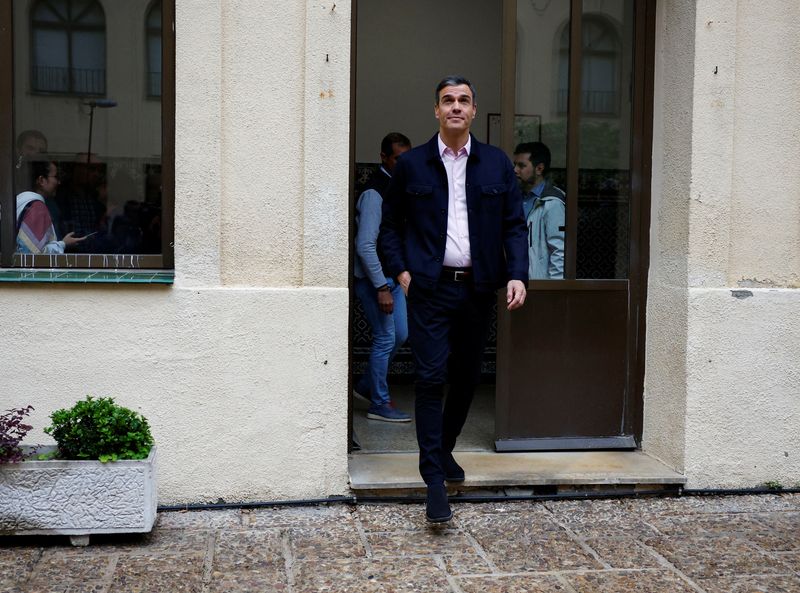
© Reuters. FILE PHOTO: Spain’s Prime Minister Pedro Sanchez appears after he casts his vote at a polling station during Regional elections, in Madrid, Spain, May 28, 2023. REUTERS/Juan Medina
2/4
By Belén Carreño, Inti Landauro and David Latona
MADRID (Reuters) – Spanish Prime Minister Pedro Sanchez called a snap election on Monday, in an apparent attempt to wrong-foot his conservative opponents and give his flagging Socialist party the best chance of retaining power before its support weakens further.
Sanchez, who has repeatedly said he wanted to serve a full term, made the unexpected announcement a day after left-wing parties were routed in a regional ballot.
His move to bring the election forward to July from late 2023 took most of his government and even some members of his inner circle by surprise, according to sources close to the prime minister.
But, as conservative opposition leader Alberto Nunez Feijoo called on voters to make him Spain’s next leader, political experts said Sanchez – whose reputation as a political risk-taker is already well established – had bet his rivals won’t be ready to fight a coordinated campaign for the July 23 poll.
Sanchez portrayed Sunday’s crippling defeat as a clear vote of no confidence in his coalition government and said he felt compelled to “take personal responsibility” for the result.
Feijoo’s mainstream People’s Party (PP) won outright control of two regional administrations and could run six more in partnership with far-right Vox, whose leader said he was ready to form coalitions with the PP. In all, 12 regions were contested.
Sanchez said he needed to “seek a clarification about the wishes of Spain’s people, a clarification about the political direction that the government should take, and about the political forces that should lead the country through that phase.”
“…I believe it is necessary to respond and submit our democratic mandate to the will of the people,” he said in a televised speech.
Sunday’s results indicate the PP and the far-right Vox could unseat Sanchez’s Socialist Workers’ Party (PSOE) if they replicated that performance at national level.
“The sooner (the election), the better,” Feijoo told a press conference, asking voters to give his party a “clear majority” to run the country.
“I ask Spaniards to make me Spain’s next prime minister,” he said, adding that he had held informal talks with Vox.
Vox leader Santiago Abascal said his party was open “creating an alternative” to Sanchez by forming national and regional governing coalitions with the PP.
FAR-RIGHT SPECTRE?
Sanchez had previously said the national election would be in December, and it is rare for a Spanish government to call a snap ballot after a poor regional election – especially when much of the country will be on holiday.
Pablo Simon, professor of political science at Madrid’s Carlos III University, said Sanchez’s strategy may be to rally support by raising the spectre of a first far-right party in government since dictator Francisco Franco died in 1975, at a time when Spain will also hold the six-month EU presidency.
“If what he aspires to do is to mobilise the left with the fear of Vox, Vox’s negotiations with the PP during this whole period are going to be taking place during this time,” Simon said.
Sources close to the prime minister said almost no one within the government knew of his decision beforehand.
“The move has caught us by surprise, but now we know about it, it is the bold gesture we need to win,” said a senior government official.
David Hernandez Martinez, professor of international relations at Madrid’s Complutense University, said Sanchez had hoped to use Spain’s EU presidency to sell himself to voters as an international statesman, and “this puts a huge spanner in his plans.”
But the prime minister has become known for taking unexpected political risks.
He took office in June 2018 by winning the first no-confidence vote in Spanish history, removing PP Prime Minister Mariano Rajoy after negotiating a pact with Catalan and Basque pro-independence parties. The fragility of his government forced him to call snap elections twice in 2019.
On Sunday, while the PSOE dropped 400,000 votes compared to the 2019 local election according to official data, its far-left junior coalition partner Podemos lost ground across the board, further weakening Sanchez’s position.
Both the PP and the anti-immigration Vox performed better than expected.
The PP won an absolute majority in the capital Madrid while the Socialists lost control of Valencia, Aragon and the Balearic islands, as well as their southwestern stronghold of Extremadura and the cities of Valencia and Seville.
Stay connected with us on social media platform for instant update click here to join our Twitter, & Facebook
We are now on Telegram. Click here to join our channel (@TechiUpdate) and stay updated with the latest Technology headlines.
For all the latest Business News Click Here
For the latest news and updates, follow us on Google News.
